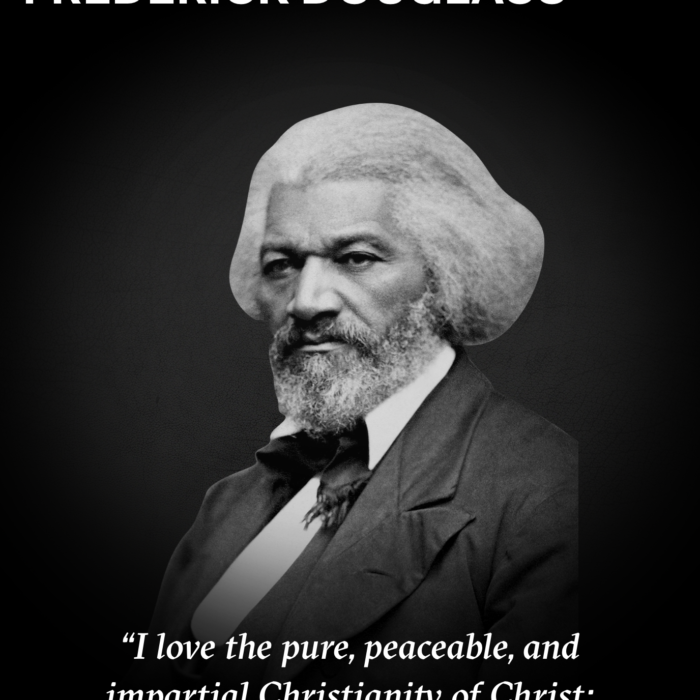
Quote: I love the pure, peaceable, and impartial Christianity of Christ: I therefore hate the corrupt, slaveholding, women-whipping, cradle-plundering, partial and hypocritical Christianity.
Quote credit: Frederick Douglass, 1845
Image credit: National Archives photo no. FL-FL-22
Synopsis copy: Frederick Douglass was a fugitive of slavery, abolitionist, laypreacher, orator, journalist, and U.S. diplomat who advocated for the equality of all peoples and rights of women.
Image credit: Collection of the Smithsonian National Museum of African American History and Culture, Gift of Joele and Fred Michaud
Body copy: Born Frederick Bailey, Douglass was taught to read by his enslaver’s wife. Later her husband forbade her to continue, so he educated himself and others with “scattered pages of the Bible.”
Image caption: Mrs. Auld teaching a young Frederick Bailey to read, 1881
Image credit: University of Illinois Urbana-Champaign / Internet Archive
Body copy: Bailey escaped slavery via the Underground Railroad, eventually settling in New Bedford, MA, as Douglass. He was licensed as a lay preacher at A.M.E. Zion Church serving as steward, clerk, and sexton.
Image caption: Mother A.M.E. Zion Church in New York, ca. 1865, was an Underground Railroad stop and may have aided Douglass’s escape.
Image credit: Library of Congress
Body copy: Douglass published an abolitionist newspaper, The North Star, from a church basement in Rochester, NY. It’s motto was “Right is of no sex—Truth is of no color—God is the Father of us all, and we are brethren.”
Image caption: The North Star, June 2, 1848
Image credit: Library of Congress, Serial and Gov’t Publications Division
Body copy: Douglass was a skilled orator, and he traveled the country lecturing about abolition. He was frequently met with opposition and physical violence from supporters of slavery.
Image caption: Police expelling abolitionists from Tremont Temple, a Baptist Church, in Boston, MA, on December 3, 1860
Image credit: Library of Congress
Body copy: When Douglass moved to Washington, DC in 1872, he attended Metropolitan A.M.E. Church. The congregation gave him a Bible as a token of their appreciation of his work. His funeral was held there in 1895.
Image caption: Inscription in the Bible given to Frederick Douglass by the Metropolitan A.M.E. Church congregation in 1889
Image credit: National Park Service
Body copy: Though Douglass publicly criticized Christian support for slavery as scandalous of American Christianity, his personal belief was strong. His home in DC held Bibles and religious books and objects.
Image caption: Douglass’s Cedar Hill home in Washington, DC, 1881
Image credit: University of Illinois Urbana-Champaign / Internet Archive
Bubble copy: Douglass’s famed 1852 oration asks, “What to the Slave is the Fourth of July?” and criticizes a hypocritical Christianity that tacitly supports slavery. He calls America to its founding ideals of liberty and equality informed by the Bible.
Image credit: University of Pittsburgh / Internet Archive
Bubble copy: “Yea! we wept when we remembered Zion … For there, they that carried us away captive, required of us a song” [Psalm 137:1–3] … Fellow-citizens, above your national, tumultuous joy, I hear the mournful wail of millions.
Source: N/A
Image credit: University of Pittsburgh / Internet Archive
Bubble copy: I will, in the name of … the constitution and the Bible which are disregarded and trampled upon, dare to call in question and to denounce … everything that serves to perpetuate slavery—the great sin and shame of America!
Source: N/A
Image credit: University of Pittsburgh / Internet Archive
Bubble copy: The feeling of the nation must be quickened; the conscience of the nation must be roused … the hypocrisy of the nation must be exposed; and its crimes against God and man must be proclaimed and denounced.
Source: N/A
Image credit: University of Pittsburgh / Internet Archive
Bubble copy: What, to the American slave, is your Fourth of July?… your prayers and hymns, your sermons and thanksgivings, with all your religious parade, and solemnity, are to him mere bombast, fraud, deception, impiety, and hypocrisy.
Source: N/A
Image credit: University of Pittsburgh / Internet Archive
Question/alignment statement: Do you think that Douglass was right in challenging the nation to live up to biblical ideals of liberty and justice in America’s founding?
Image credit: US Mint
Scripture: When you lift your hands in prayer, I will not look at you. No matter how much you pray, I will not listen, for your hands are covered with blood. … Stop all this evil that I see you doing.
Scripture credit: Isaiah 1:15–16a
Image credit: incamerastock / Alamy Stock Photo
Related changemakers: Abraham Lincoln, Sojourner Truth, Grimke/Weld